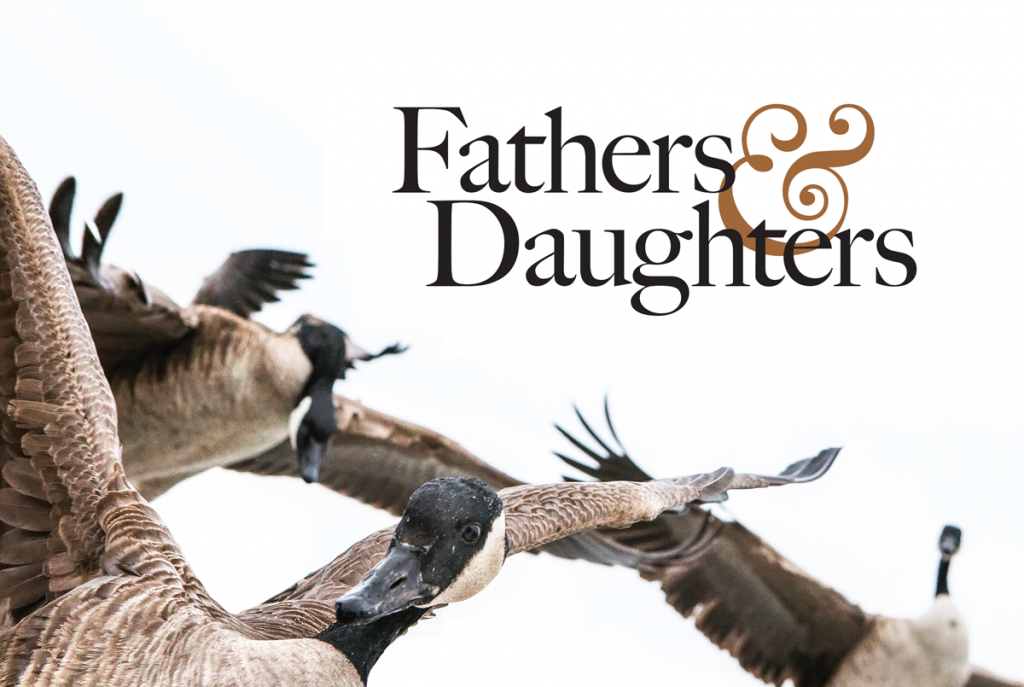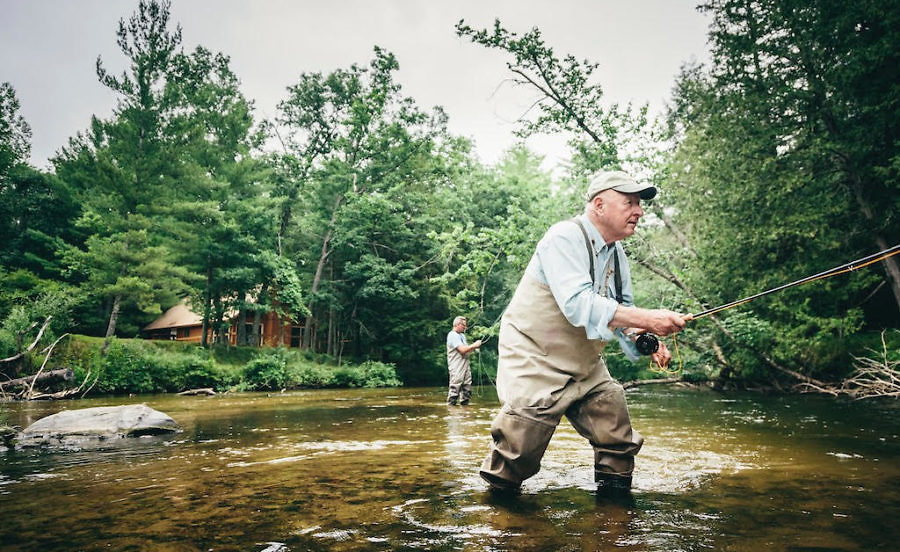
Melancholy and hope, on a season’s bitter end.
[by Samuel Lucy]
PAUL WAS THINKING OF CAMILLE’S THICK WAVY HAIR and her smile that expressed an air of importance as she steered the outboard up-lake after her first duck shoot earlier in the fall. October’s orange colors swelled the marsh’s blue water. Puffed-up clouds in a warming sky reminded him that summer had begun to wane. There would be leaves to rake and pile that afternoon, firewood to split and stack, garden work, too. All this would be pleasing work after the morning hunt. She’d likely fall asleep on the ride home following a treat at the bakery. She’d been up at 4:30 and in the truck by quarter to five.
“If only I was this fast when it came to making the bus, huh, Papa?” Her wit alone nearly broke him. Never mind that she was already eight. She loved watching the Labs take turns on the birds.
Then there were the pinfeathered first-of-the-season birds to pluck and clean by the woodpile, where the cats lounged in the late sun. She’d help choose the meat for that night’s grill and vacuum-pack the rest. Maybe they’d grill and eat the whole lot?
The geese talked to the silhouettes when they first spotted them; Paul called on his flute. The birds responded and turned his way— 30 strong.
To have and to hold, all right; things always deepened when the leaves turned. Right then, his heart sighed, wanting that moment frozen as he’d wanted the past eight years to rewind and then proceed a lot slower. She herself had said more than once: “I don’t want to grow up. . . .” But then, he and she wouldn’t have now, and that is what was to be gained by putting one’s heart on the line—as it had once been with lovers, with dogs, and now with children. Children trumped them all. The mere hint of loss in this regard was agonizing, yet it had played on his mind. Within their community, there were too many parents who endured such a cruelty, most recently a good friend, Ray, whom he’d hunted with late last season, just after the new year.
While leaving the marsh that opening morning, Paul knew that he’d never visit it again without remembering this time with Camille. Even if she decided just once was enough, she’d already gotten a taste of early-season duck hunting when all the local birds mixed with the early comers. He and she hid in the tall grass by the beaver lodge, and the Labs perched comfortably as gadwalls, pintail, mallards, and divers buzzed through in the early hours—enough birds so Paul tried to shake off the rust of the past eight months, regained some of his old swing, and dumped a few right there in front of the decoys so Camille could understand shooting range.
“Okay, this one is going to be a shot,” she had said as a pintail swung wide over the grass, cupped, tucked in its long neck, and headed for the blocks she’d help place. They watched it flare, and Paul stood and buckled the bird as it tried to climb for those early autumn clouds, and everything went still a moment before she said, “Whoa . . . got that one!” And then chose which dog to send.
SINCE THAT OCTOBER MORNING ONLY THREE MONTHS HAD PASSED, but it seemed long ago. Though he’d asked her a few times, Camille decided not to join him again that season, even for an afternoon hunt. He’d had some good hunts with steady friends, including Ray, who’d shot his first goose.
If the autumn’s mellowing colors weren’t enough to elicit the blues, the low gray fog over the mighty winter river, the silence, and the last day of the season all added to Paul’s shaded heart. Heavier on his mind, though, on this Sunday, when he may have had enough hunting for the year, was that he’d convinced himself he could easily have stayed home with the family. It had been his wife who exclaimed: “I can’t believe you’re not going to hunt!” And that had done it. He loaded the gear and dogs and headed down-valley to the big river.
Over the previous few hunts, Paul had hunted over water, and the divers and geese had afforded late-season shooting, but it hadn’t been as good as usual. He’d not been field hunting since Christmas, and as another whole season drew to a close, he regretted not scouting more, though he knew some puddlers and geese were using the standing corn, even as snow deepened. After an hour or more of looking for a place to hunt, Paul settled on a particular corn plot deep within the refuge. The spot bordered a long strip of corn and sat not 50 yards from the river. Better yet, he had a windbreak behind him.
He had brought only a couple dozen silhouettes and left the rest of his shells and field gear home—the hunt almost an afterthought. As he considered decoy placement, he scanned the skies but saw nothing but hawks, thin lines of bare trees, and eagles working the river for crippled birds, surfacing fish, or whatever else they might gather up during this coldest time. He set the decoys in walking fashion on the corn’s edge. He placed the goose sentries in the white opening to draw attention, then placed the mallards right in the horseshoe pocket of the geese. Finished, Paul found plenty of cover in the windbreak for himself and the dogs, and began the wait.
Watching over a frozen field with the low ceiling of fog felt somehow lonelier than sitting over the big water, where almost always, there were birds circling, even if they moved offshore. Guilt began to creep in. Perhaps he felt sorrowful because he’d not stayed home to ski or sled or skate with the girls. Yet, there was plenty of winter left. He supposed, too, that other fathers might be watching football or doing something other than family sledding— this came as small consolation.
Once, he heard geese from out on the big water, but they seemed as far away as the moon. He wished for some company. He’d asked his daughter to come along; she’d declined. “Next year, Papa. If it’s okay . . .”
“Right,” he’d replied. “Hunting alone is good, too.”
Already, just the one hunt that fall, and Paul feared Camille might be growing bored—not just with hunting but with him as well. After all, he’d been the only one shooting. Her presence there in the frozen corn with the silence working on him would have added new purpose and perhaps given him light, yet Paul felt creeping thankfulness that she’d stayed home. Seeing boredom on her face would have taken him deeper into his funk, which had burdened him so that he himself felt an awkward boredom—something that he’d never experienced during a hunt. Then he heard geese murmuring behind him. Are they coming?
He reached over and steadied the dogs. The field was small and the birds would have to work tightly from the side to drop in, but they’d been here. In this field. Their footprints in the snow and their droppings provided proof. He waited.
The shots would be close if they committed. Then he spotted them; already sliding inland and toward the bluffs. The geese talked to the silhouettes when they first spotted them; Paul called on his flute. The birds responded and turned his way— 30 strong. Too many, he thought—too damn many eyes. But they kept coming. Their noisy approach lifted his low mood.
